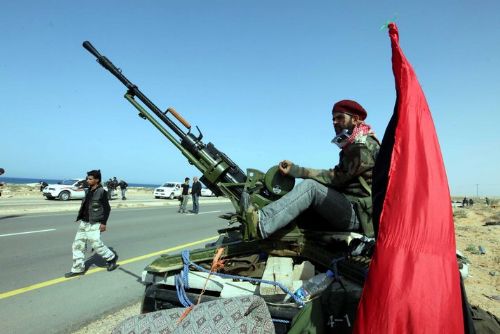Muammar Gaddafi's loyalists said on Monday they had captured 17 mercenaries -- some British and French -- in what would amount to a severe blow to Libya's new rulers and their international backers, Reuters reported.
The claim by the fugitive ousted leader's spokesman Moussa Ibrahim could not be verified, but it comes as the new authorities are facing stark reversals on the battlefield and in the political arena.
Nearly a month after Gaddafi was driven from power, his loyalist holdouts have beaten back repeated assaults by National Transitional Council forces at the town of Bani Walid and Gaddafi's home city of Sirte. NTC fighters have been sent fleeing in disarray after failing to storm Gaddafi bastions.
The NTC, still based in the eastern city of Benghazi, has faced questions about whether it can unify a country divided on tribal and local lines. A long-promised attempt to set up a more inclusive interim government fell apart overnight.
"A group was captured in Bani Walid consisting of 17 mercenaries. They are technical experts and they include consultative officers," Gaddafi spokesman Ibrahim said on Syria-based Arrai television, which has backed Gaddafi.
"Most of them are French, one of them is from an Asian country that has not been identified, two English people and one Qatari."
The French foreign ministry said it had no information about the report. The British foreign ministry said it was aware of media reports about the capture of mercenaries but was not able to substantiate them. Qatari officials were not immediately available for comment.
NATO, which is staging air strikes on Gaddafi loyalist positions, says it has no troops on the ground in Libya.
However, Western nations have sent special forces in the past, and media have reported that private security firms have aided anti-Gaddafi forces in training, targeting and with leadership. Gulf Arab states have also sent trainers and arms.
DEBACLE
The interim government's attempts to seize Bani Walid, 150 km (95 miles) southeast of Tripoli have become a debacle, with forces repeatedly surging into the town only to be driven out by its pro-Gaddafi defenders.
On Monday, NTC forces were unable to approach the northern gate to attack the town because of heavy gunfire from Gaddafi loyalists.
Fighters said on Sunday plans had gone awry for tanks and pickup trucks with machine guns and rocket launchers to lead an attack. Foot soldiers piled in first, only to be driven out.
"There is a lack of organization so far. Infantry men are running in all directions," said Zakaria Tuham, a senior fighter with a Tripoli-based unit.
Many fighters spoke of tension between units drawn from Bani Walid itself and those from other parts of the country.
Some fighters openly disobeyed orders. In one incident, an officer from Bani Walid was heckled by troops from Tripoli after he tried to order them to stop shooting in the air.
NTC forces and NATO warplanes also attacked Sirte, Gaddafi's birthplace, where assaults have been repelled. Hundreds of families were fleeing the city on Monday as NTC forces rolled up with huge rocket launchers and artillery.
Humanitarian groups have voiced alarm at reported conditions in the besieged coastal city.
"There's no electricity, no phone coverage. Nothing," resident Ibrahim Ramadan said, standing by a car packed with his family at a checkpoint. Interim government forces were handing out juice to civilians and rifling through their belongings to search for weapons.
Interim government forces amassed on the western outskirts of Sirte and exchanged scores of rockets with pro-Gaddafi fighters inside the city. They were advancing cautiously and using heavy artillery to try to weaken loyalist defense lines.
As in many episodes during Libya's conflict, the front lines at Sirte and Bani Walid have moved back and forth, with shows of bravado crumbling in the reality of battle.
In Benghazi, interim Prime Minister Mahmoud Jibril failed to name a new cabinet when his proposals did not receive full backing from all current members.
"We have agreed on a number of portfolios. We still have more portfolios to be discussed," Jibril told reporters at a news conference on Sunday.
A list of the approved ministries was not available, though sources familiar with the negotiations said that the position of Jibril himself was a sticking point during the talks.
There was also disagreement about whether it was necessary to form a transitional government before declaring Libya "liberated," which NTC officials say can only happen when remaining Gaddafi loyalists are defeated.
The political infighting reveals some of the fractures in an alliance that was united during the conflict by opposition to Gaddafi but divided among pro-Western liberals, underground Islamist guerrillas and defectors from Gaddafi's government.
The NTC has its roots in Libya's east, but most of the militiamen who finally succeeded in driving Gaddafi out of Tripoli are from towns in the west. Fighters are organized by home town into units with little overall coordination.
Gaddafi himself remains on the run. Ibrahim, his spokesman, has repeatedly said he is still in Libya directing resistance.
In addition to Bani Walid and Sirte, his fighters also control the town of Sabha deep in the Sahara desert, effectively dividing the east of the country from the west and making it difficult for the NTC to exert control.






